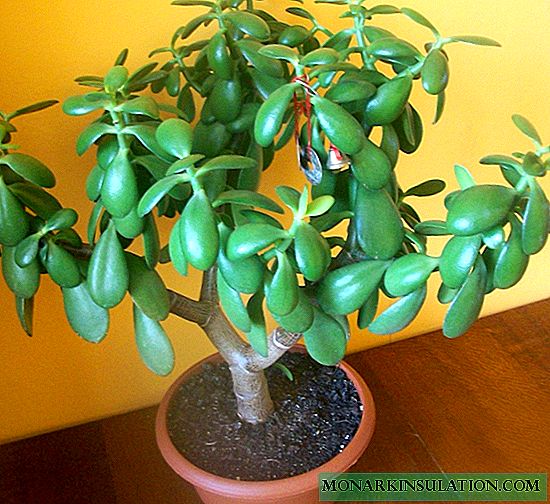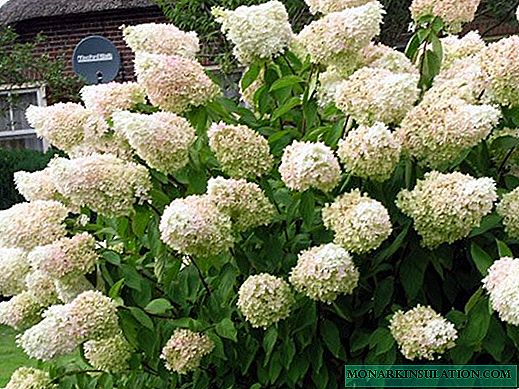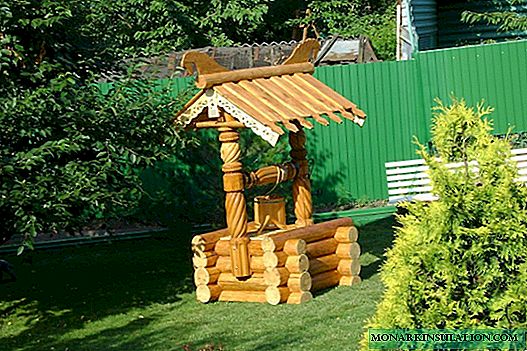
The well in the country is both a source of cool clean water and a decorative element. If, according to the style of design, the well is integral with other buildings, the site looks more attractive. It is not in vain that a considerable number of summer residents place purely decorative wells on their plots - wooden, decorated with carvings, with improvised flowerbeds on the lid, etc. A lid for a well with your own hands can be made of various materials - wood, metal, plywood, plastic. To prevent debris, insects, small animals from falling into the well, the lid must be tightly fixed, strong, provide airflow and, of course, be beautiful.
Wood is the most successful material for making a well cover: it looks beautiful, is an environmentally friendly material, and has excellent performance characteristics. The wooden cover, if you use decorative elements, looks the most aesthetically pleasing.

In this case, the well is sheathed with a narrow beam, a bench and a cover are made of it - a beautiful practical design has been obtained. For convenience, hinged doors with handles are made in the lid - so that each time you do not fold it completely
Option # 1 - a simple wooden lid
A decorative cover on a well made of wood can be made independently; its manufacturing process is quite simple. For the lid you need to choose strong wood - elm, aspen will do. You can use pine, but the wood of this tree is softer. Size, shape of the product are determined according to the type of construction and the neck of the well.
The easiest way is to make a cover in the form of a hatch. You will need nails, hinges, measuring tools, dry boards with grooves, handles, loops, six bars (20-30 cm for one cover), a hacksaw, a tight rubber belt, screwdrivers, and a hammer.
A wooden lid is best done double. This is done so that in winter it does not freeze. You can make a hinged or removable cover - which one it will be, determine during the preparation of the work plan.

A hinged lid for the hinged well with a convenient wooden handle is practical and easy to manufacture. Hinges and a carved handle give a simple design a decorative look
Work begins with the device of the crate and the necessary measurements. To ensure that the hatch is firmly located in the neck, it is necessary to make the crate. It is made of bars in the size of the neck. To sheath the structure, you can use tes. Metal hinges are attached to it. The hinges can be replaced with a rubber strap - one end is nailed to the cover, the other to create.

The easiest option for a well cover is a timber crate, wooden boards. In cold winter conditions, it is recommended to make two such covers and lay a heater between them, this will help the water not freeze
The main functions of the second wing (if you chose this option) are additional protection and overlapping gaps, if any. For strength, the lid in the center from the bottom is reinforced with a beam. A pair of identical covers is made - lower and upper. The bottom is installed at the bottom of the neck, the top - at the top. In winter, a straw pillow is placed between them to warm. If in your region the temperature drops to -20 degrees or more in winter, a double cover is required - otherwise the water will freeze.
The simplest handles for a wooden lid are bars filled parallel to each other. But for greater convenience and aesthetics, you can use ready-made wooden or metal handles. As for the castle - this is a matter of personal choice. Some use shut-off devices to provide greater well safety during the absence of owners.
After making the cover, you can think about how to decorate the well. There are two traditional options: to make a decorative house on poles or to install a flat roof of a round or rectangular shape. The roof can be gable in the form of a house, flat, round, sloping - at your discretion. You can use various materials to decorate it - natural and bituminous tiles, metal tiles, creepers and vines, straw, boards, slate, carved decor, etc.
Option # 2 - PCB cover
The cover for the well can be made from textolite and metal corners. For its manufacture you will need textolite, sealant, profile pipes, cement, handles and loops, tape measure, welding machine, bolts, screws, grinder, screwdrivers and a hammer.

Textolite is a strong laminate impregnated with resins. It is easy to handle, and such a lid can last a long time.
Using a tape measure, we make measurements, we cut the metal corners at an angle of 45 °. The resulting four segments are welded into a quadrangle. For the strength of the frame, the corners are welded both from the outside and from the inside, the welding marks are removed by the grinder.
We cut the profile pipes so that their length is a centimeter shorter than the length of the corners. In the metal frame, we insert pipe segments along the perimeter of the base, and weld them to the base, the seams are processed by a grinder.
Then, two plates corresponding to the size of the frame are made of PCB. A layer of insulation is laid between the plates, then they will need to be fastened together with self-tapping screws, the seam is treated with a sealant. To connect the resulting cover and frame, we use hinges that can be installed using bolts or welding.
The cover for the PCB well is ready. For installation on the well, formwork is made of boards, everything is cemented. After installation, the frame with the lid is covered with a layer of cement. To use the lid was more convenient, a handle is screwed to it. You can leave the structure as is, or you can paint it to give a more aesthetic appearance.

Alternatively, you can make or buy a finished cover made of plastic. It can be used as temporary or permanent if the winters in your area are not too cold.
Stainless steel can also be used to make the lid, but this option is more suitable for a well made of reinforced concrete rings.
Option # 3 - pommets for a house-shaped well
The lid can also be made in the form of a wooden house (gable roof). First, the frame is made using the same technology as the gable roof, but of the appropriate size. To access the water on the front slope of the "house" is a single-leaf door. The frame is made of wood, it can be painted or sheathed with any roofing material - you get a very aesthetic decorative cover on the well.

The top for a well in the shape of a house is not only a variant of the cover, but also a wonderful decorative element. In this case, the house is made of smooth timber, the roof is finished with shingles, a design with double-leaf doors on hinges and comfortable handles is a reliable protection for a moisture source
A self-made wooden lid for the well is not much inferior to the finished one - it is a practical design to protect the moisture source from weather conditions and debris. Having done it yourself, you will save money and also try yourself as a designer.
The options considered give an idea of how you can make a lid for a well yourself. Its production will not take you much time, and your well will receive reliable protection.











